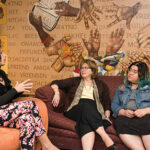
For 25 years, the Women’s Center has provided co-curricular programming, support services, and advocacy for marginalized individuals and communities, along with campus-wide activities such as Take Back the Night, Sexual Assault Awareness Month, Critical Social Justice, and more. UMBC Magazine talked with center director Jess Myers, Vice Provost of Faculty Affairs Patrice McDermott, and special projects coordinator Amelia Meman ’15, GWST, for their thoughts about the center’s mission.
What do you see as the role of a women’s center on a university campus in today’s environment?
Jess Myers: There are so many women in higher education. But just because there are more women, doesn’t mean that there is the quality of experience. There’s still sexism. There’s still racism. There’s still able-ism. I think what women’s centers have been doing is really expanding that notion of which women, and really thinking about all the different kinds of women and their experiences in higher education and what can we do to expand the net in regards to reaching them and supporting their experience here at UMBC, but also in higher education as a whole.
Amelia Meman: It’s also about sort of empowering many different sorts of women. So you talk a little bit about gender equity on campus. But that looks like many different things. So supporting survivors of sexual assault because their stories don’t often get told and also supporting women of color, which has been a renewed focus of the Women’s Center in these past years. Critical Social Justice is also important because it is a way of expanding the notion of what activism can look like, and expands the notion of what women can do and what anybody can do really. The Women’s Center tackles all of these things in the broadest way, but also in the most grounded and people-centered way, which is really special to me. We not only do feminism, we not only do stuff for women, but we try to make social justice a priority. It’s something that we take very seriously.
The Women’s Center, in its early years, didn’t always have an office. As an early advocate of the center, Dr. McDermott, how has the place changed since taking up permanent residence in The Commons?
Patrice McDermott: When [The Commons] was created, a lot of the academic student and staff community around these issues fought to get this location and to get a full-time director. And then, we had this space…and what was done with this space, it’s amazing. We never imagined that this is what this would be, physically as well as it’s the hub of not just those sort of traditional issues that you would associate with women – the sort of expansion into a more nuanced understanding of gender rather than just in the body. It’s not a surprise that the Critical Social Justice work is – that this is one of the anchors on campus for that, because even before we used the word in academia – intersectional – that was the ethos of this space.
Myers: When we’re talking about who we are, what we do, we say we’re a place and we’re a space: a space for people to come out and take a deep breath to feel like their home away from home, but also a place of learning and activism and support. So we really do mean it as an active place that is doing things, but also a space to just take a deep breath and be a community and reconnect and be with people.
McDermott: It has a presence that you feel when you walk in the door, but it also has a presence on the campus for people and it’s a very dynamic space. I would be remiss if I didn’t mention that we saw a parallel, but quite different sort of explosion, in the gender and women’s studies department. These are the pillars if you will, on the campus. It’s one of the reasons I’m at UMBC.
See a collection of historic items from the Women’s Center’s history at bit.ly/womenscentercollection.





